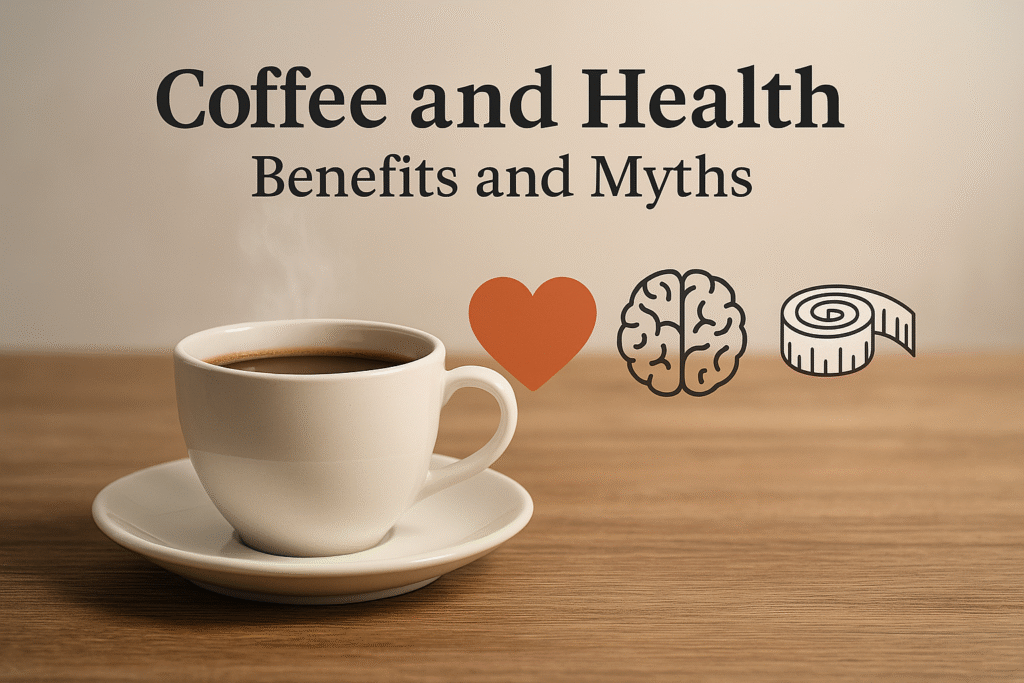Coffee is more than a daily ritual for millions of people around the world; it’s a complex beverage deeply connected to culture, science, and well-being. Although opinions often differ, the truth behind coffee health is far more nuanced than simple claims. In fact, understanding how to enjoy coffee mindfully begins with acknowledging its many layers, starting with the scientifically supported benefits and moving through the myths that still persist. As a result, embracing coffee health with a balanced mindset becomes essential, especially when navigating mixed information.
What Exactly Is in Your Cup?
When exploring coffee health, it helps to first understand what coffee actually contains. While coffee may appear simple, it is made up of more than 1,000 bioactive compounds that interact with the body in different ways. Additionally, caffeine plays a central role as a natural stimulant that enhances alertness and cognitive performance. Beyond that, antioxidants such as chlorogenic acid help reduce inflammation and combat oxidative stress, supporting the body’s long-term health. Even minerals like magnesium and potassium contribute to overall well-being, demonstrating why coffee health is influenced by several interconnected elements.
Scientifically Backed Health Benefits of Coffee
Improved Mental Performance
First, caffeine blocks adenosine, a neurotransmitter responsible for drowsiness, which results in sharper focus and faster reaction times. Because of this, many people rely on coffee to boost productivity, highlighting how coffee health includes cognitive benefits when consumed appropriately.
Lower Risk of Type 2 Diabetes
Moreover, extensive research shows that regular coffee drinkers have a reduced risk of developing type 2 diabetes. Antioxidants and anti-inflammatory compounds found in coffee help improve insulin sensitivity, strengthening the connection between everyday habits and long-term coffee health outcomes.
Protection Against Neurodegenerative Diseases
Additionally, studies reveal that moderate coffee consumption may protect against neurodegenerative conditions such as Alzheimer’s and Parkinson’s. Compounds in coffee support dopamine regulation and protect brain cells, reinforcing the role of coffee health in supporting cognitive longevity.
Liver Health Support
Furthermore, coffee has been associated with a significantly reduced risk of liver diseases, including fatty liver, cirrhosis, and even liver cancer. Research suggests that drinking two to three cups daily contributes to a healthier liver profile, expanding the list of coffee health benefits supported by science.
Lower Risk of Certain Cancers
While research is ongoing, some studies suggest that coffee may reduce the risk of colorectal, endometrial, and prostate cancers. Its strong antioxidant properties contribute to this effect, showing how coffee health remains a topic of continuous scientific interest.
Longevity and Overall Wellness
Consequently, meta-analyses indicate that moderate coffee consumers may live longer on average. This is likely due to coffee’s positive influence on metabolic, cardiovascular, and liver function, reinforcing the broader relationship between lifestyle choices and coffee health.
Common Myths About Coffee
Myth 1: Coffee Dehydrates You
Contrary to popular belief, coffee does not dehydrate you. While caffeine is mildly diuretic, habitual coffee consumption still contributes to your fluid intake, proving that coffee health concerns about dehydration are largely unfounded.
Myth 2: Coffee Is Bad for the Heart
Although excessive caffeine can temporarily raise blood pressure, moderate consumption does not increase heart disease risk in healthy people. In fact, some studies suggest reduced stroke risk, showing how coffee health depends more on balance than avoidance.
Myth 3: Coffee Stunts Growth
There is no scientific evidence supporting this claim. While limiting caffeine for children and teens is recommended, this myth does not hold up, and therefore does not impact modern coffee health guidelines.
Myth 4: Dark Roast Contains More Caffeine
Surprisingly, light and dark roasts contain nearly the same amount of caffeine. Since light roasts are denser, they may even contain slightly more, reflecting how coffee health relies on accurate knowledge rather than old assumptions.
Myth 5: Pregnant Women Must Avoid Coffee Entirely
Health authorities agree that up to 200 mg of caffeine per day is safe during pregnancy. Instead of eliminating coffee, moderation supports safer coffee health practices for expecting mothers.
How Much Coffee Is Safe to Consume?
Understanding safe caffeine limits is an essential part of maintaining coffee health. For most adults, up to 400 mg of caffeine per day — roughly four 8-oz cups of brewed coffee — is considered safe. Exceeding this amount may cause jitteriness, anxiety, digestive issues, or sleep disruptions. Given these risks, individuals with heart conditions, anxiety disorders, or those who are pregnant should consult a health professional before increasing intake to align with proper coffee health recommendations.
Healthy Coffee Habits for Everyday Wellness
Developing mindful habits further enhances coffee health. Choosing quality beans ensures higher antioxidant levels and better flavor. Reducing sugar prevents unnecessary calorie intake, while minimizing syrups and heavy creamers keeps coffee from becoming a dessert. Additionally, drinking water alongside coffee helps maintain hydration, and timing caffeine earlier in the day supports healthy sleep patterns. Together, these habits create a sustainable approach to coffee health, emphasizing balance rather than restriction.
Final Thoughts: Understanding Coffee Health Wisely
In the end, coffee is not simply a beverage — it’s a powerful blend of culture, science, and personal well-being. When enjoyed in moderation, it offers numerous benefits supported by decades of research. Its potential to protect the brain, support metabolic health, and enhance daily performance demonstrates why coffee health remains a popular topic worldwide. Nevertheless, every individual reacts differently, making self-awareness and balance key. Listening to your body ensures you experience the advantages without the drawbacks, allowing coffee to enrich your lifestyle in a mindful and enjoyable way.
